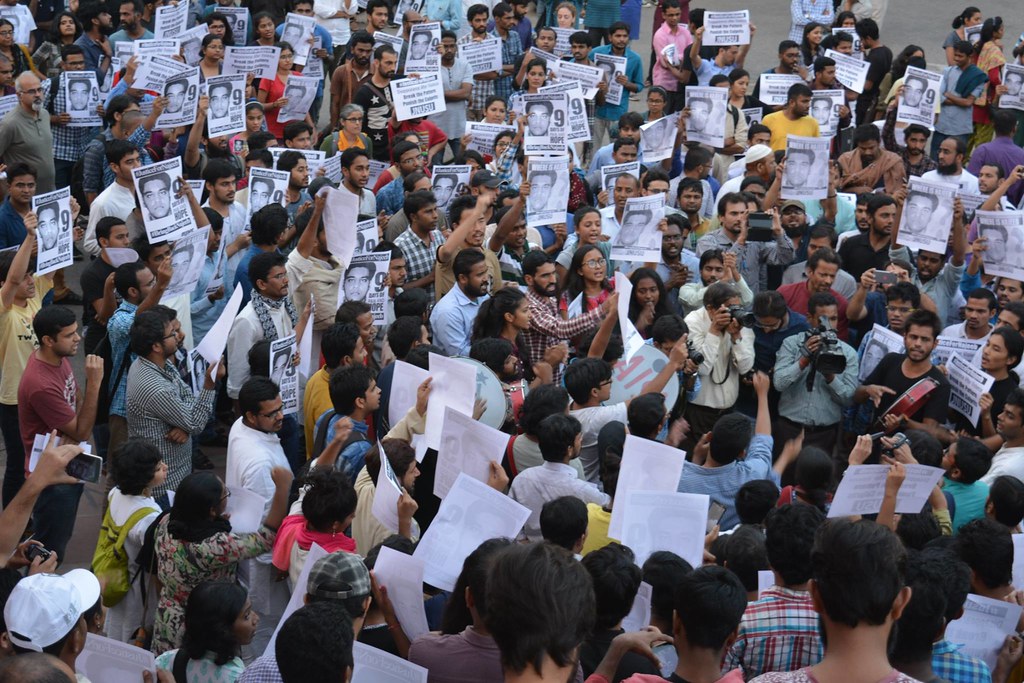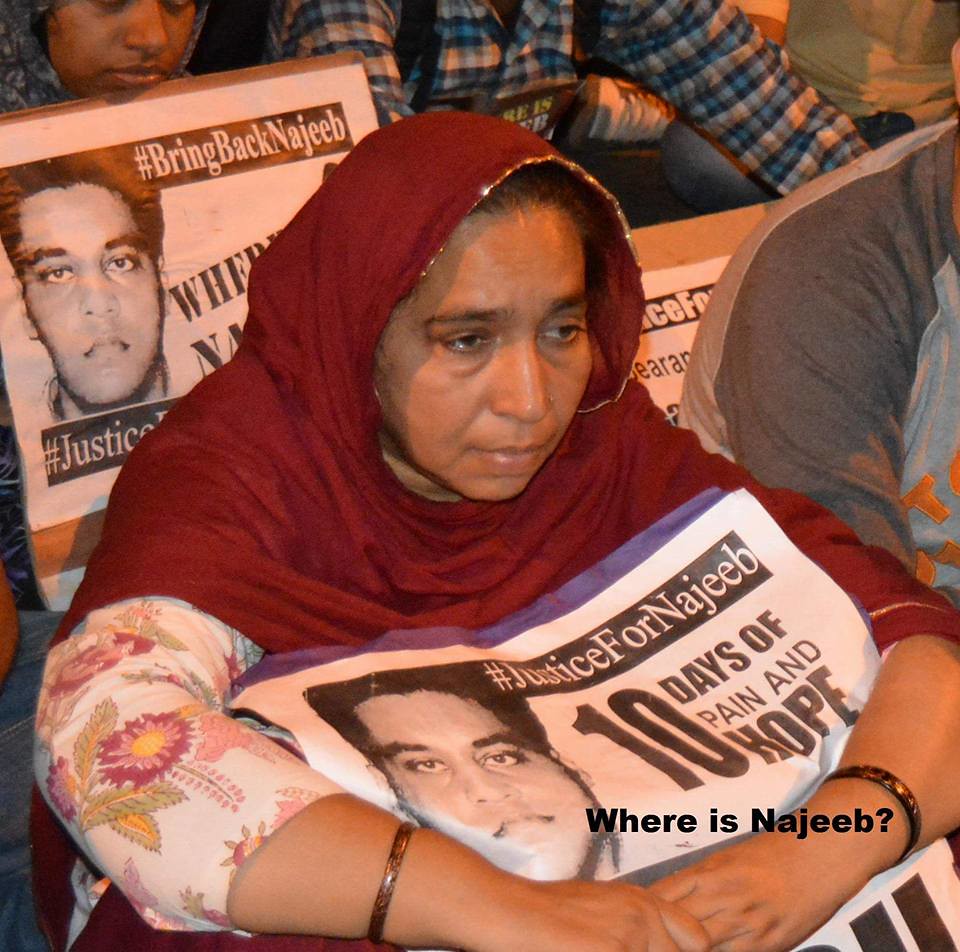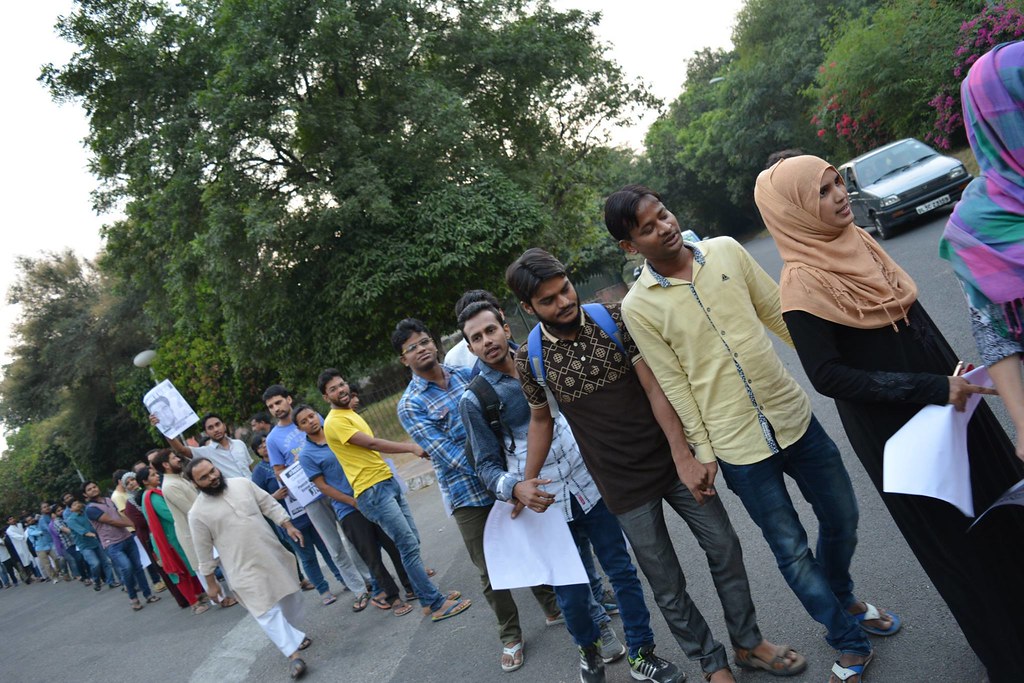By Saidalavi P.C. for Twocircles.net
All photos by Samim Asgor Ali
In times of distress faith keeps you going, my mother fondly says. Then I think of faith as something to cling to, like a shrub held in dire hope by a drowning fellow. Maybe faith actually helps, but I think it doesn’t necessarily have to be of a singular kind. When you are in a new place, getting to know the nitty-gritties of the surroundings and the cultural milieu, you get to imbibe a faith in the people, in the ideals they hold and the cultural practices they uphold. Then there are times when your faith is shaken by either untoward incidents or by deliberate actions, and then you are prompted to doubt whatever was hitherto held was genuine and true.
My intention here is to probe into what I consider to be my own shaken faith in the so-called progressive, radical section in academic institutions. No doubt anyone can identify any number of people belonging to different cultural backgrounds and faiths in academia. But there is also a section in academia, as in political activism or artistic enterprises, who claims to garb themselves as progressive, radical and what not. This section is overpopulated by English-speaking, urban, mostly male, upper-caste members. There is a characteristic feature of this section across the spectrum by which it showcases itself as ‘different’. This is the condescension, sniggering and sometimes outright dismissal of those who are upholding cultural faiths. By this standard, a person belonging to either Dalit or Muslim cultural backgrounds will be dismissed as identitarian (casteist and communal), backward-looking, narrow-minded and undeserving any attention and engagement.
The dismissal in itself is not malicious if it is done with proper critique it deserves. But here the critique is begun and exhausted in their cultural attributes themselves. A person, claiming to uphold Hindutva ideals, will be kept at arm’s length by stereotyping him as ‘sanghi’ and therefore to be forcefully ignored. Whenever some kind of a violence is perpetrated by such groups, the so-called progressive section will mourn it as a blot on the ‘secularist’ ideals of the nation. There are two kinds of hypocrisy perpetrated by this section here; one, by holding onto secularism as an ideal in times of violence, they are devoid of any responsibility to think about Hindutva itself. Second, by upholding secularism as an ideal in such situations they can paper over the cultural roots of Hindutva violence. That is, being a Muslim or a Dalit in itself constitutes the fittest candidate for Hindutva violence is forgotten here. In short, this progressive section is too complacent to realise their complicit role in the violence.
There is also another, more dangerous aspect to the nature of this progressive section. That is, in times of crisis, they are too prone to fall prey to Hindutva sentiments. A JNUSU president signing a letter which clearly mentions the alleged crime conducted by a Muslim student and keeps mum on the brutal assault meted out more than once to the Muslim student speaks volumes about the cowardice of this progressive section. But this cowardness is of a special kind. It surfaces only when the victims of violence are Dalits or Muslims. They would also advocate the victims to downplay the cultural identities of the victims and holler at the sorry state of our secularism. In another sense, there is a crucial similarity in terms of methods between Hindutva groups and this progressive section. Hindutva ideology seeks to homogenise society with a holistic ideal at the centre of which lies the idea of the nation. Here the cultural homogenisation is sought to be established by talking about ‘nation’. The progressive section tries to portray a nation not by cultural homogenisation but by transcending them. But there is also a complexity in the latter case; they may not easily denounce the cultural practices as such, but the violence done to such cultures will be understood as ‘non-cultural’ by them.
The dilemma of the progressive section, I think, also arises from fear, fear of being impure. The fear of being contaminated and polluted by cultural faiths and attributes lies at the centre of progressive consciousness. It may be due to such fears that this section, overpopulated by upper-caste, urban, males ardently claim to be secularists and not believing in clinging to cultural attributes. We should understand this fear as deeply rooted in casteism. In other words, ardent secularism of the so-called progressive section in itself derives from ‘brahminical consciousness’.
I am more and more convinced in the context of Najeeb’s disappearance in JNU that this progressive section is very much communal. Their communalism is more visible than their casteism. Many of the cultural stereotypes attributed by Hindutva groups to Muslims is swallowed hook, line and sinker by this progressive section. It is due to this ignorance of the hollowness of their progressivism that this section advises to erase the tag of a Muslim from a victim. In a sense, they borrow most of the ideas propagated by Hindutva groups to look down upon, and certainly to ‘secularise’ Muslims and will simultaneously tell them to forget all such attributes they hitherto attached to them in times of crisis. Muslims who stand for the cause, not along with this chameleon progressives, will be accused of playing politics, being petty, and so on. The ‘real’ politics, according to them is one understood by them as guarding secularism. But their secularism is ingrained in the fear of the other.
There is also another curious side of the secularism upheld by this progressive section. This secularism is always understood in negative terminologies or in opposition. They profess to be intuitively safeguarding the secularism when they oppose Hindutva groups. Fine, let us agree with this assumption for the moment. But by this logic everybody who is opposed to Hindutva must be a secularist. But this would not be a proposition acceptable to the progressive section, since it would have to accept many political parties of dubious ideals in its umbrella. Though this section cannot ally with them for various reasons, they conveniently play their intellectual counterpart in many occasions by your ‘secularist assertions’ as an oppositional culture to Hindutva.
If the progressive section actually wants to be secularists, it should first unlearn its casteism and communalism. For that to happen, the upper-caste, urban, English-speaking, mostly male should first acknowledge that they also share certain cultural attributes and they haven’t transcended many of them. Moreover, they should first turn their gaze to their own cultural brethren and try to ‘secularise’ them. Without turning one’s gaze to his/her own cultural backgrounds and work with them, does one have any moral right to snigger at others belonging to different cultural faiths?
Najeeb is a Muslim student. He has been assaulted by Hindutva elements. The progressive section was complicit in the violence. They continued to do so by not accepting this fact. Now they continue to do so by their cold-bloodedness. May a fire fall from hell on their head and devour their consciousness!
The author is a Ph.D candidate at Centre for the Study of Social Systems, School of Social Sciences, JNU, Delhi




